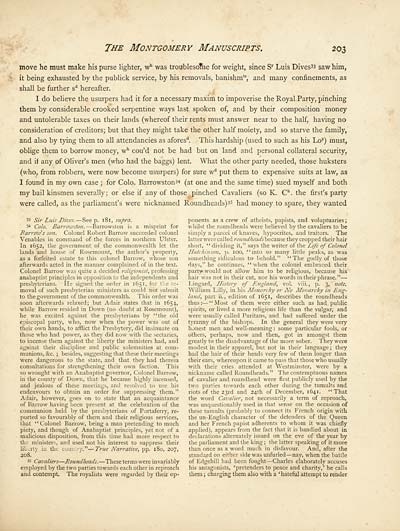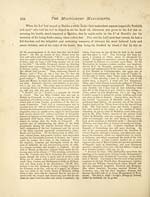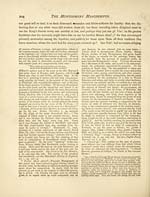Montgomery manuscripts
(217) Page 203
Download files
Complete book:
Individual page:
Thumbnail gallery: Grid view | List view

The Montgomery Manuscripts.
203
move he must make his purse lighter, w b was troublesome for weight, since S 1 ' Luis Divest saw him,
it being exhausted by the publick service, by his removals, banishm 18 , and many confinements, as
shall be further s d hereafter.
I do believe the usurpers had it for a necessary maxim to impoverise the Royal Party, pinching
them by considerable crooked serpentine ways last spoken of, and by their composition money
and untolerable taxes on their lands (whereof their rents must answer near to the half, having no
consideration of creditors; but that they might take the other half moiety, and so starve the family,
and also by tying them to all attendancies as afores d . This hardship (used to such as his Lo p ) must,
oblige them to borrow money, \v h cou'd not be had but on land and personal collateral security,
and if any of Oliver's men (who had the baggs) lent. What the other party needed, those huksters
(who, from robbers, were now become usurpers) for sure w d put them to expensive suits at law, as
I found in my own case ; for Colo. Barrowstons* (at one and the same time) sued myself and both
my bail kinsmen severally; or else if any of those pinched Cavaliers (so K. C h . the first's party
were called, as the parliament's were nicknamed Roundheads)3 s had money to spare, they wanted
33 Sir Luis Dives. — See p. 181, supra.
34 Colo. Barrowsttm. — Barrowston is a misprint for
Barrow's son. Colonel Robert Barrow succeeded colonel
Venables in command of the forces in northern Ulster.
In 1652, the government of the commonwealth let the
lands and house of Rosemount, the author's properly,
as a forfeited estate to this colonel Barrow, whose son
afterwards acted in the manner complained of in the text.
Colonel Barrow was quite a decided religionist, professing
anabaptist principles in opposition to the independents and
presbyterians. He signed the order in 1 651, for the re-
moval of such presbyterian ministers as could not submit
to the government of the commonwealth. This order was
soon afterwards relaxed; but Adair states that in 1654.,
while Barrow resided in Down (no doubt at Rosemount),
he was excited against the presbyterians by "the old
episcopal party, who, now when the power was out of
their own hands, to afflict the Presbytery, did insinuate on
those who had power, as they did now with the sectaries,
to incense them against the liberty the ministers had, and
against their discipline and public solemnities at com-
munions, &c. ; besides, suggesting that these their meetings
were dangerous to the state, and that they had therein
consultations for strengthening their own faction. This
so wrought with an Anabaptist governor, Colonel Barrow,
in the county of Down, that he became highly incensed,
and jealous of these meetings, and resolved to use his
endeavours to obtain an order for suppressing them."
Adair, however, goes on to state that an acquaintance
of Barrow having been present at the celebration of the
communion held by the presbyterians of Portaferry, re-
ported so favourably of them and their religious services,
that "Colonel Barrow, being a man pretending to much
piety, and though of Anabaptist principles, yet not of a
malicious disposition, from this time had more respect to
the ministers, and used not his interest to suppress their
liberty in the country." — True Narrative, pp. 180, 207,
208.
35 Cavaliers — Roundheads. — These terms were invariably
employed by the two parties towards each other in reproach
and contempt The royalists were regarded by their op-
ponents as a crew of atheists, papists, and voluptuaries ;
whilst the roundheads were believed by the cavaliers to be
simply a parcel of knaves, hypocrites, and traitors. The
latter were called roundheads because they cropped their hair
short, " dividing it," says the writer of the Life of Colonel
Hutchinson, p. ioo, "into so many little peaks, as was
something ridiculous to- behold." "The godly of those
days," he continues, "when the colonel embraced their
party would not allow him to be religious, because his
hair was not in their cut, nor his words in their phrase." —
Lingard, History of England, vol. viii. , p. 3, note.
William Lilly, in his Monarchy or No Monarchy in Eng-
land, part ii. , edition of 165 1, describes the roundheads
thus: — "Most of them were either such as had public
spirits, or lived a more religious life than the vulgar, and
were usually called Puritans, and had suffered under the
tyranny of the bishops. In the general they were very
honest men and well-meaning : some particular fools, or
others, perhaps, now and then, got in amongst them
greatly to the disadvantage of the more sober. They were
modest in their apparel, but not in their language ; they
had the hair of their heads very few of them longer than
their ears, whereupon it came to pass that those who usually
with their cries attended at Westminster, were by a
nickname called Roundheads." The contemptuous names
of cavalier and roundhead were first publicly used by the
two parties towards each other during the tumults and
riots of the 23rd and 24th of December, 1641. "That
the word Cavalier, not necessarily a term of reproach,
was unquestionably used in that sense on the occasion of
these tumults (probably to connect its French origin with
the un-English character of the defenders of the Queen
and her French papist adherents to whom it was chiefly
applied), appears from the fact that it is bandied about in
declarations alternately issued on the eve of the year by
the parliament and the king ; the latter speaking of it more
than once as a word much in disfavour. And, after the
standard on either side was unfurled — nay, when the battle
of Edgehill had been fought — Charles elaborately accuses
his antagonists, 'pretenders to peace and charity,' he calls
them ; charging them also with a 'hateful attempt to render
203
move he must make his purse lighter, w b was troublesome for weight, since S 1 ' Luis Divest saw him,
it being exhausted by the publick service, by his removals, banishm 18 , and many confinements, as
shall be further s d hereafter.
I do believe the usurpers had it for a necessary maxim to impoverise the Royal Party, pinching
them by considerable crooked serpentine ways last spoken of, and by their composition money
and untolerable taxes on their lands (whereof their rents must answer near to the half, having no
consideration of creditors; but that they might take the other half moiety, and so starve the family,
and also by tying them to all attendancies as afores d . This hardship (used to such as his Lo p ) must,
oblige them to borrow money, \v h cou'd not be had but on land and personal collateral security,
and if any of Oliver's men (who had the baggs) lent. What the other party needed, those huksters
(who, from robbers, were now become usurpers) for sure w d put them to expensive suits at law, as
I found in my own case ; for Colo. Barrowstons* (at one and the same time) sued myself and both
my bail kinsmen severally; or else if any of those pinched Cavaliers (so K. C h . the first's party
were called, as the parliament's were nicknamed Roundheads)3 s had money to spare, they wanted
33 Sir Luis Dives. — See p. 181, supra.
34 Colo. Barrowsttm. — Barrowston is a misprint for
Barrow's son. Colonel Robert Barrow succeeded colonel
Venables in command of the forces in northern Ulster.
In 1652, the government of the commonwealth let the
lands and house of Rosemount, the author's properly,
as a forfeited estate to this colonel Barrow, whose son
afterwards acted in the manner complained of in the text.
Colonel Barrow was quite a decided religionist, professing
anabaptist principles in opposition to the independents and
presbyterians. He signed the order in 1 651, for the re-
moval of such presbyterian ministers as could not submit
to the government of the commonwealth. This order was
soon afterwards relaxed; but Adair states that in 1654.,
while Barrow resided in Down (no doubt at Rosemount),
he was excited against the presbyterians by "the old
episcopal party, who, now when the power was out of
their own hands, to afflict the Presbytery, did insinuate on
those who had power, as they did now with the sectaries,
to incense them against the liberty the ministers had, and
against their discipline and public solemnities at com-
munions, &c. ; besides, suggesting that these their meetings
were dangerous to the state, and that they had therein
consultations for strengthening their own faction. This
so wrought with an Anabaptist governor, Colonel Barrow,
in the county of Down, that he became highly incensed,
and jealous of these meetings, and resolved to use his
endeavours to obtain an order for suppressing them."
Adair, however, goes on to state that an acquaintance
of Barrow having been present at the celebration of the
communion held by the presbyterians of Portaferry, re-
ported so favourably of them and their religious services,
that "Colonel Barrow, being a man pretending to much
piety, and though of Anabaptist principles, yet not of a
malicious disposition, from this time had more respect to
the ministers, and used not his interest to suppress their
liberty in the country." — True Narrative, pp. 180, 207,
208.
35 Cavaliers — Roundheads. — These terms were invariably
employed by the two parties towards each other in reproach
and contempt The royalists were regarded by their op-
ponents as a crew of atheists, papists, and voluptuaries ;
whilst the roundheads were believed by the cavaliers to be
simply a parcel of knaves, hypocrites, and traitors. The
latter were called roundheads because they cropped their hair
short, " dividing it," says the writer of the Life of Colonel
Hutchinson, p. ioo, "into so many little peaks, as was
something ridiculous to- behold." "The godly of those
days," he continues, "when the colonel embraced their
party would not allow him to be religious, because his
hair was not in their cut, nor his words in their phrase." —
Lingard, History of England, vol. viii. , p. 3, note.
William Lilly, in his Monarchy or No Monarchy in Eng-
land, part ii. , edition of 165 1, describes the roundheads
thus: — "Most of them were either such as had public
spirits, or lived a more religious life than the vulgar, and
were usually called Puritans, and had suffered under the
tyranny of the bishops. In the general they were very
honest men and well-meaning : some particular fools, or
others, perhaps, now and then, got in amongst them
greatly to the disadvantage of the more sober. They were
modest in their apparel, but not in their language ; they
had the hair of their heads very few of them longer than
their ears, whereupon it came to pass that those who usually
with their cries attended at Westminster, were by a
nickname called Roundheads." The contemptuous names
of cavalier and roundhead were first publicly used by the
two parties towards each other during the tumults and
riots of the 23rd and 24th of December, 1641. "That
the word Cavalier, not necessarily a term of reproach,
was unquestionably used in that sense on the occasion of
these tumults (probably to connect its French origin with
the un-English character of the defenders of the Queen
and her French papist adherents to whom it was chiefly
applied), appears from the fact that it is bandied about in
declarations alternately issued on the eve of the year by
the parliament and the king ; the latter speaking of it more
than once as a word much in disfavour. And, after the
standard on either side was unfurled — nay, when the battle
of Edgehill had been fought — Charles elaborately accuses
his antagonists, 'pretenders to peace and charity,' he calls
them ; charging them also with a 'hateful attempt to render
Set display mode to:
![]() Universal Viewer |
Universal Viewer | ![]() Mirador |
Large image | Transcription
Mirador |
Large image | Transcription
Images and transcriptions on this page, including medium image downloads, may be used under the Creative Commons Attribution 4.0 International Licence unless otherwise stated. ![]()
| Histories of Scottish families > Montgomery manuscripts > (217) Page 203 |
|---|
| Permanent URL | https://digital.nls.uk/95235531 |
|---|
| Description | A selection of almost 400 printed items relating to the history of Scottish families, mostly dating from the 19th and early 20th centuries. Includes memoirs, genealogies and clan histories, with a few produced by emigrant families. The earliest family history goes back to AD 916. |
|---|

